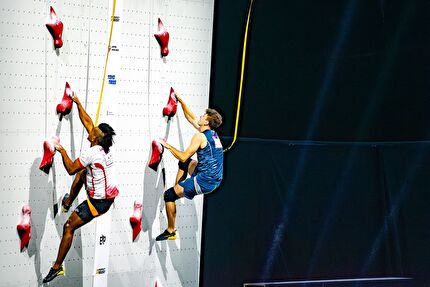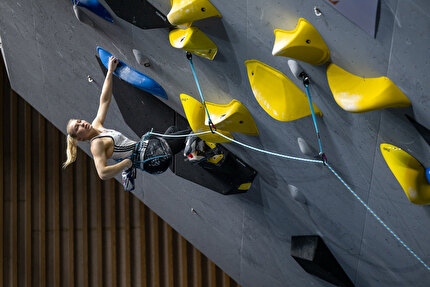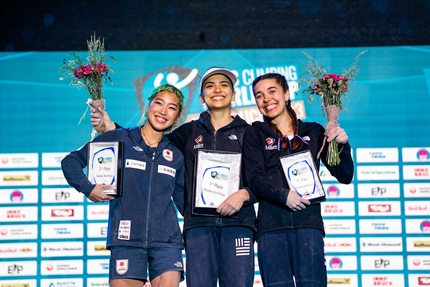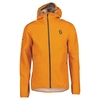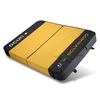Janja Garnbret reigns supreme in Innsbruck, Amagasa Sohta wins Boulder, Jakob Schubert claims Lead
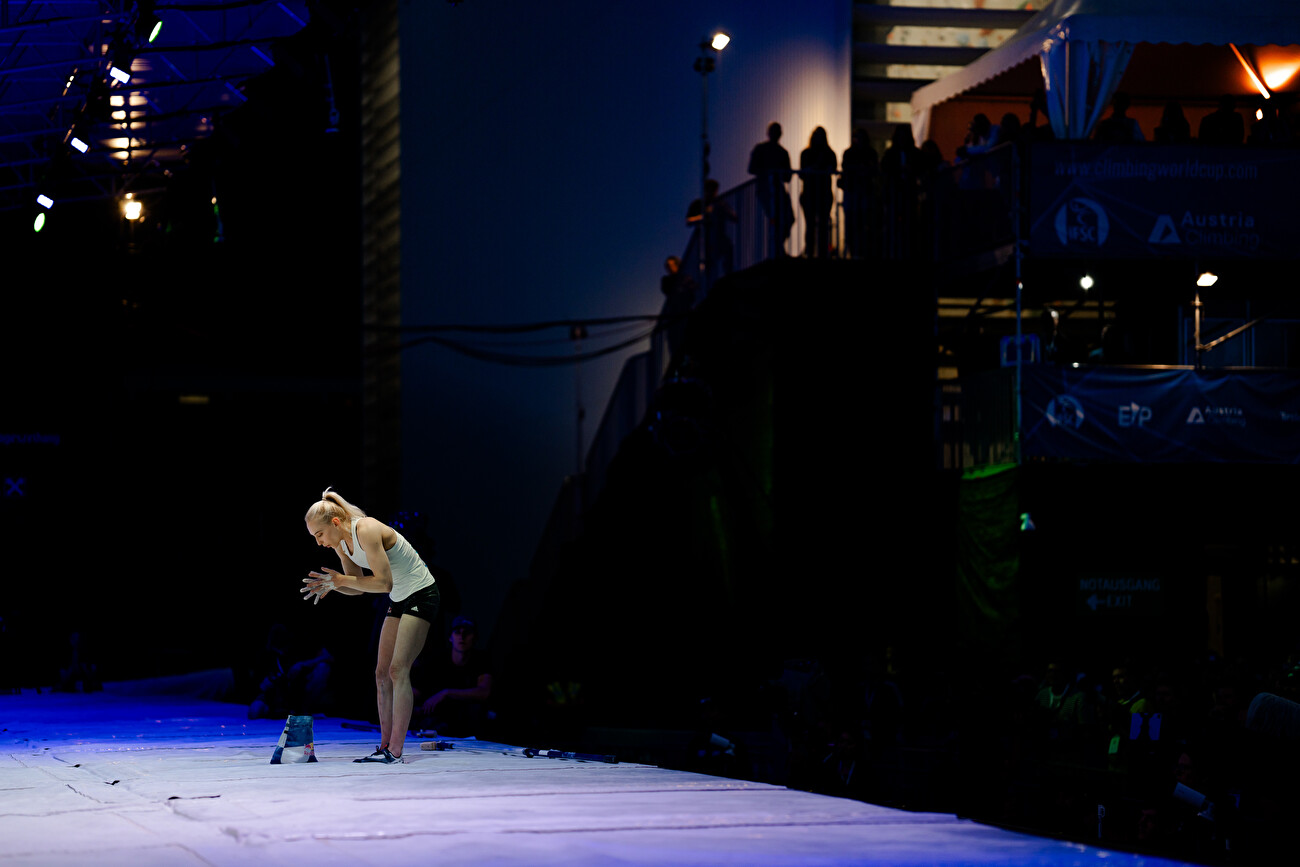
 1 / 6
1 / 6 Lena Drapella / IFSC
Lena Drapella / IFSC
Five days of top-class climbing unfolded last week as the legendary Kletterzentrum in Innsbruck, Austria, hosted the fourth IFSC World Cup stage of the season with the Boulder and Lead World Cup.
BOULDER
WOMEN
After the qualifications last Wednesday, the first of four finals took place on Thursday and lived up to the expectations of a sold-out Kletterzentrum, crowning Slovenian multi-decorated climber Janja Garnbret with the 17th Boulder World Cup gold of her career. The outcome of the final, however, was only decided at the end of the fourth and decisive boulder, which only Garnbret managed to top after three attempts, eventually bursting in tears as the 3,000 fans that filled the venue celebrated her victory.
“I was a little bit stressed today, to be honest. First, I very much enjoyed the semi-final today, it was a hard round, the boulders were very hard, but this is what we train for. The final felt a little bit easier, I needed to stay focused until the end, and I’m happy that I managed to do it, I’m happy for the last boulder which was the hardest. It was a great test before Paris, I feel great,” said Garnbret moments after the final concluded.
The 25-year-old finished with four tops and four zones, placing ahead of 17-year-old teammate Jennifer Eucharia Buckley and 16-year-old Annie Sanders of the USA. Both Buckley and Sanders concluded their final with three tops and three zones, only failing to solve problem number four. Buckley, competing in her first-ever Boulder World Cup, managed to place ahead of her US rival thanks to one attempt-to-top less. Both Buckley’s silver and Sanders’ bronze are the first World Cup medal won by the two young climbers.
Japan’s Nakamura Mao concluded just outside of the medal positions, taking fourth place and recording her best-ever results at a World Cup event. Tokyo 2020 Olympian Jessica Pilz of Austria placed fifth, and Fanny Gibert of France closed in sixth position.
MEN
The Men's Semifinals and Finals took place on Friday. Climbing in front of 3,000 roaring fans, Team Japan absolutely dominated the final, but not in the way many would have expected. Indeed, current Boulder World Cup champion and world ranking number one Anraku Sorato only concluded in third place with two tops and three zones, failing to top the fourth and decisive boulder and winning his first World Cup bronze medal in the discipline.
The top of the podium was taken by 24-year-old Amagasa Sohta, securing the first gold of his career with a three-top, three-zone performance that closed in spectacular fashion, as the climber from Kanagawa topped M4 in four attempts. Amagasa said: “I can’t believe it, it feels like a dream! My performance today was very good, almost perfect. Now I will skip Lead and focus on the event in Prague. Arigato!”
Completing the all-Japanese podium. Narasaki Meichi won his second consecutive silver in Innsbruck, also closing the round with three tops and three zones, but also a higher number of attempts to top than Amagasa.
Team Japan’s fourth final participant, Kayotani Ritsu placed sixth with no tops and three zones. Future Paris 2024 Olympian Toby Roberts of Great Britain and first-time final participant Elias Arriagada Krüger of Germany finished in fourth and fifth position. Roberts with two tops and two zones, Arriagada Krüger with one top and three zones.
This is the third time that the Japanese national team have swept the men’s Boulder podium: first it happened in 2021, also in Innsbruck, with Ogata Yoshiyuki, Narasaki Tomoa, and Fujii Kokoro respectively taking gold, silver, and bronze. The following season, in Seoul, South Korea, Fujii won gold, Narasaki won silver, and Ogata won bronze.
LEAD
Five days of top-class climbing ended at the legendary Kletterzentrum in Innsbruck, Austria, in front of the fourth consecutive 3,000-people sold-out crowd, as Austria’s Jakob Schubert and Slovenia’s Janja Garnbret updated their impressive medal tally. Opening the show was home favourite Schubert, who climbed last in the men’s Lead final, and despite not clipping the highest quickdraw, still finished with a best score of 49+ and claimed his 21st World Cup gold in the Lead discipline.
Schubert said: “Climbing here at home is always different, it’s always special, and this route today was exceptionally special because it was such a crazy fight from halfway up. Every move I felt like I was going to fall. I might have not been the best climber on the route tonight, but I was the best fighter, and that’s what brought me to victory. And it was also only possible because of the crowd. I’m always really focused and don’t hear too much while I climb, I would say. I wouldn’t recognise which song was playing, but it was crazy loud when I made that move and I immediately knew that that was probably the victory. From there I felt like I could almost enjoy it… I mean, not really, because I was way too pumped.”
Completing the podium were experienced climber Alexander Megos of Germany, second at 42+, and Toby Roberts of Great Britain, third with 41+. USA’s Colin Duffy – who won gold in both Boulder and Lead in Innsbruck two years ago – took fourth position. Three Japanese climbers – Tanaka Shuta, Homma Taisei, and Narasaki Tomoa – respectively concluded in fifth, sixth, and eighth place. First-time final participant Jonas Utelli of Switzerland took seventh place.
As the rain kept falling on the Kletterzentrum, the women’s Lead final started off the wrong foot, as four of the first six athletes on the wall all fell on the same dynamic move and scored 22+. The two final climbers taking the wall, however, were worth the wait.
First, it was Japan’s Mori Ai, who spent quite some time on the crux section, but once she surpassed it, she cruised towards the top and secured the last quickdraw with more than 15 seconds left on the clock, putting all the pressure in the world on her rival Janja Garnbret’s shoulders.
Two days after winning Boulder gold in the very same venue, the Slovenian put on a show for most part of her climb, but ended up struggling to read one of the last moves and spent more than one minute trying to find the way to unlock it. Eventually, the Tokyo 2020 champion figured it out and sealed the top score with only three second left. Thanks to a better placement in the semi-final round, Garnbret won gold – making it now 28 in total in Lead World Cup competitions – while Mori had to settle for silver.
“Every single win means a lot to me, because I’m always with my feet on the ground, I don’t take things for granted, I’m always focused and determined to win, the feeling is incredible every single time,” commented Garnbret. “This was my last World Cup before the Olympics. I will go home and take some time to rest, and then train until Paris 2024!”
The podium was completed by Seo Chaehyun of South Korea with 36. Austria’s Jessica Pilz, Bulgaria’s Alexandra Totkova, USA’s Annie Sanders, and Austria’s Mattea Pôtzi, took positions from fourth to seventh with 22+, mirroring the order they were ranked at the end of the semi-final. China’s Zhang Yuetong closed in eighth place with 21+.
The IFSC World Cup Series 2024 will continue in Chamonix, France, with Lead and Speed competitions taking place from 12 to 14 July. The last World Cup event before the Olympic Games Paris 2024 will then take place in Briançon, France, from 17 to 19 July.



 Copia link
Copia link
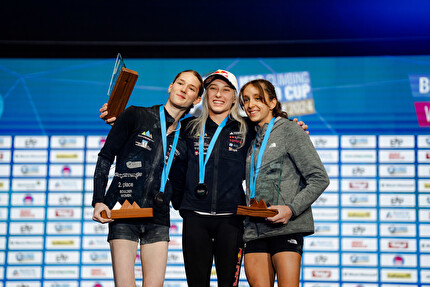
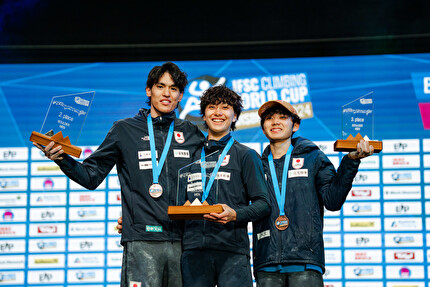
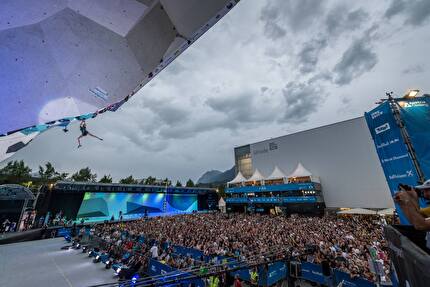
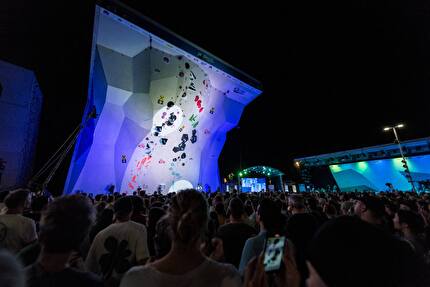
 See all photos
See all photos